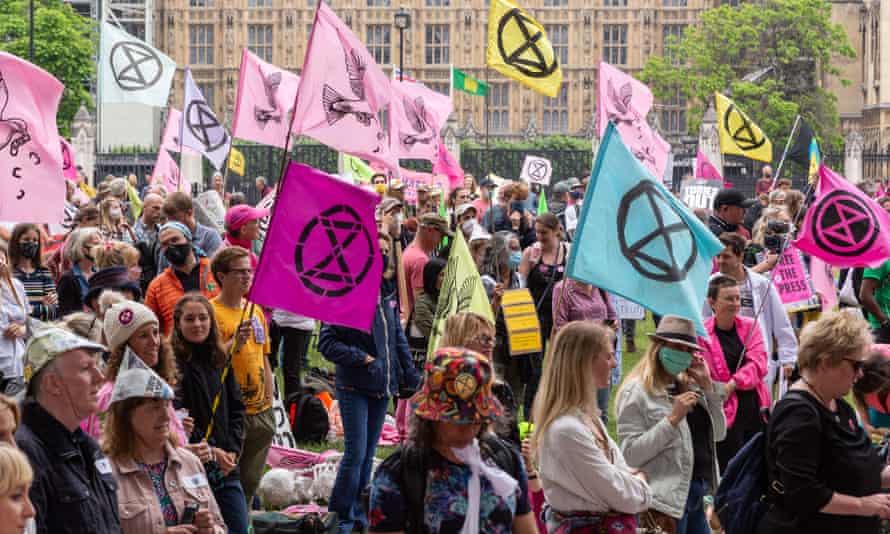Extinction Rebellion targets City of London over climate role
Protests starting next week aim to highlight the billions poured into fossil fuels by financial sector

The City of London will be the target of a new round of Extinction Rebellion protests aimed at highlighting the role of high finance in the climate crisis, starting next week and carrying on for at least a fortnight.
Thousands of protesters are expected to take part in a series of actions in the City, details of which are under wraps. These will target businesses headquartered in the Square Mile financial district, and will include site occupations. There are no plans to disrupt public transport, as has occurred during some previous actions.
Extinction Rebellion said the protests would be “joyous” and have a “celebratory” air while highlighting the billions poured into fossil fuels and high-carbon activities by financiers based in London’s financial districts.
Businesses listed on the London Stock Exchange or financed from the UK account for about 15% of global carbon emissions, according to the activist group, and if London’s financial markets were a country they would be the world’s ninth biggest emitter of carbon.
Anneka Sutcliffe, an Extinction Rebellion member, said: “We expect the protests to be disruptive. The focus will be on the City, where the power holders are.”
She said at least 2,000 people had recently signed up to the group, and she estimated that nearly half of the protesters likely to take part were new to the movement.
Most employees in the City have been working from home throughout the past year owing to the Covid-19 pandemic, but many have been coming under pressure to return to the office.
The protests will start with a rally in Trafalgar Square on Monday morning, 23 August. This is the anniversary of the Haitian slave rebellion of 1791 and the international day for the remembrance of the slave trade and its abolition. XR said its events were also intended to show solidarity with people in the global south who are worst affected by climate breakdown.
Esther Stanford-Xosei, a co-founder of XR’s International Solidarity Network, said: “[The power of international finance in promoting fossil fuels] is the promulgation of Empire 2.0. We have the responsibility to hold governments and corporations to account, especially corporations registered on the London Stock Exchange. People in the global south have shown the way to live sustainably.”
She said the aim was to show how the world could be changed by ordinary people coming together. “We are not powerless – you have more power than you think,” she said. “We are the collective power to be the change that we need.”
The government and its management of Cop26, the UN climate talks due to be held this November in Glasgow, are also key targets. Jon Lynes, 93, a veteran of Extinction Rebellion protests – which have often featured retired people who have said they have more freedom to take part in protests where they may be arrested – said: “This is a critical moment for our government to do something. But they have cut down overseas aid while increasing armed forces spending, and dithered over a coalmine in Cumbria and new oilfields. It is really a disgrace. This is why now is the moment [for protest].”
Tim Crosland, of the pressure group Plan B, who was found in contempt of court for revealing early a supreme court ruling relating to Heathrow’s third runway plans, said: “We are targeting the City because these are the kind of people who are the real contributors to this crisis.”
He spoke out against recent claims by members of the Conservative party that reaching net zero emissions by 2050 – the government’s target, set out in law – would cost too much money. “It’s embarrassing to claim that it is too expensive to save young people and our country and our planet. This is extremist ideology from some parts of the Conservative party,” he said. “They believe science will have to give way to the market, but it is not going to work that way, it’s the other way round. The economy will have to adapt to the science.”
A City of London police spokesperson said: “The City of London police is working closely with the Metropolitan Police Service and British Transport Police to appropriately and proportionately respond to protest activity in London over the next fortnight and a policing plan is in place. There will be a greater number of officers deployed to ensure balance between the right to protest and the rights of Londoners to go about their daily lives.”